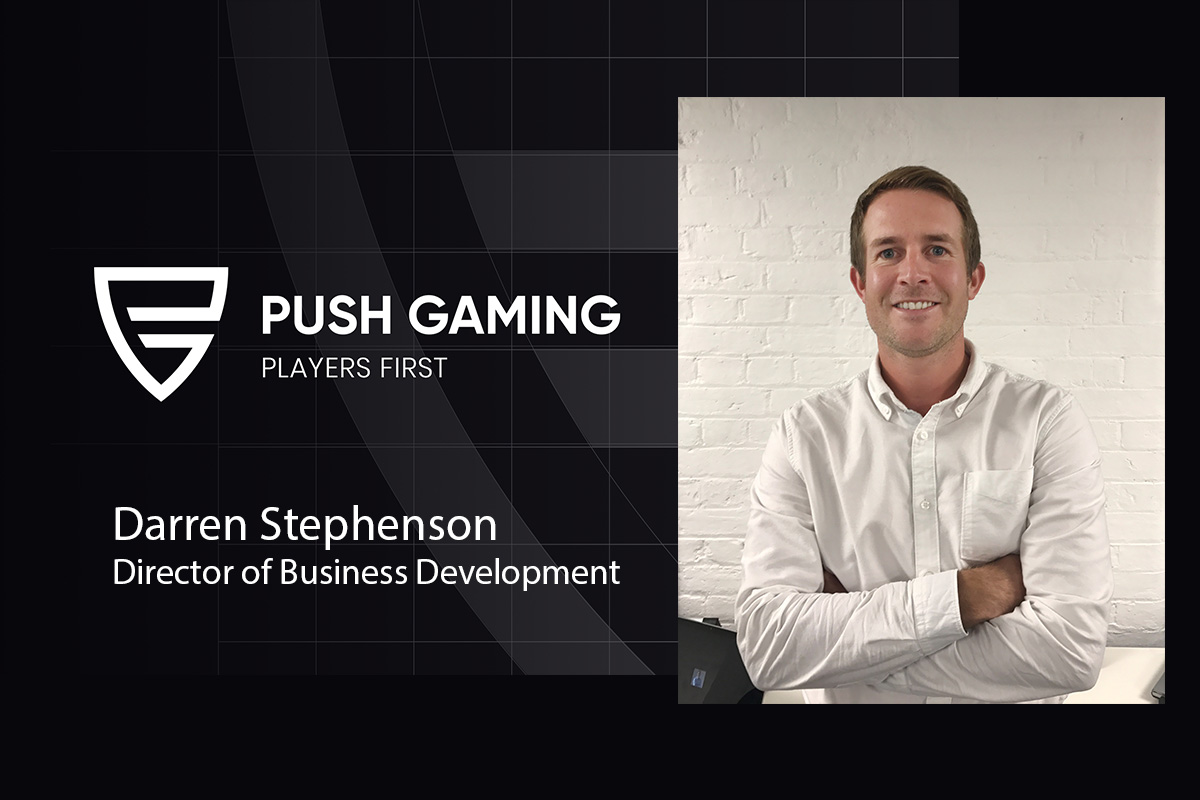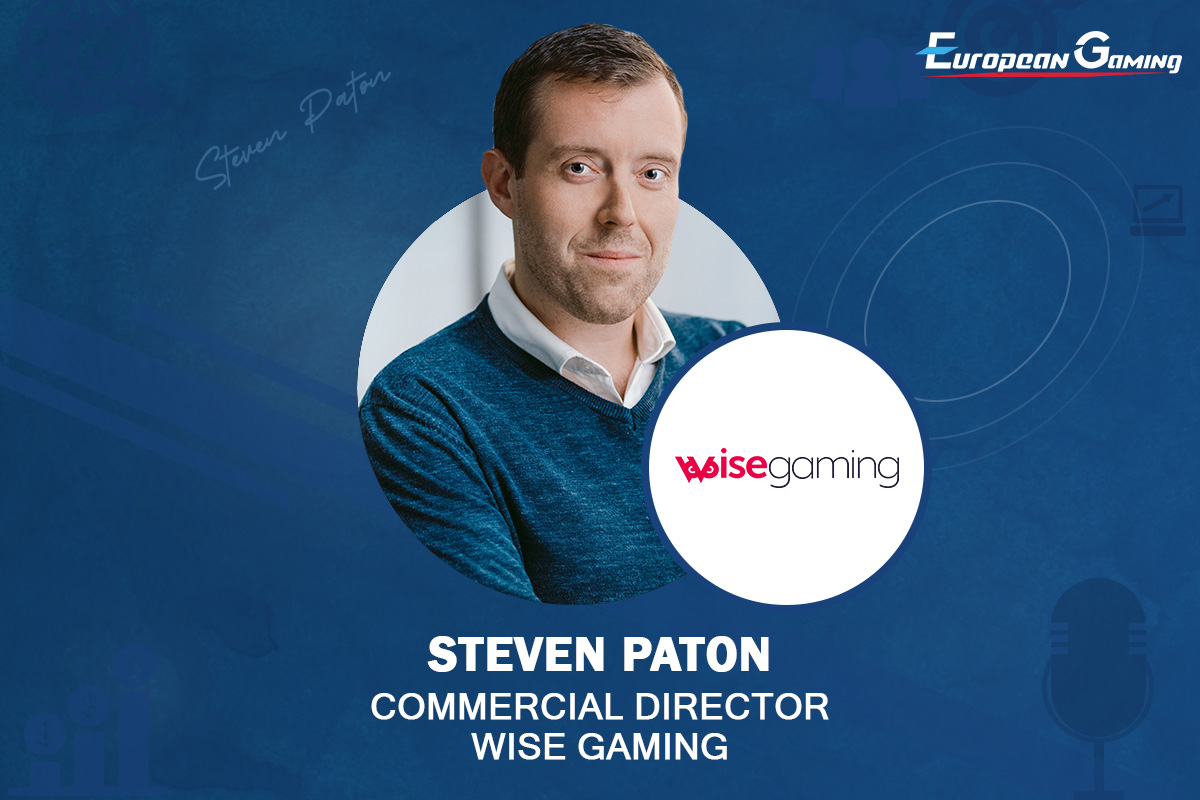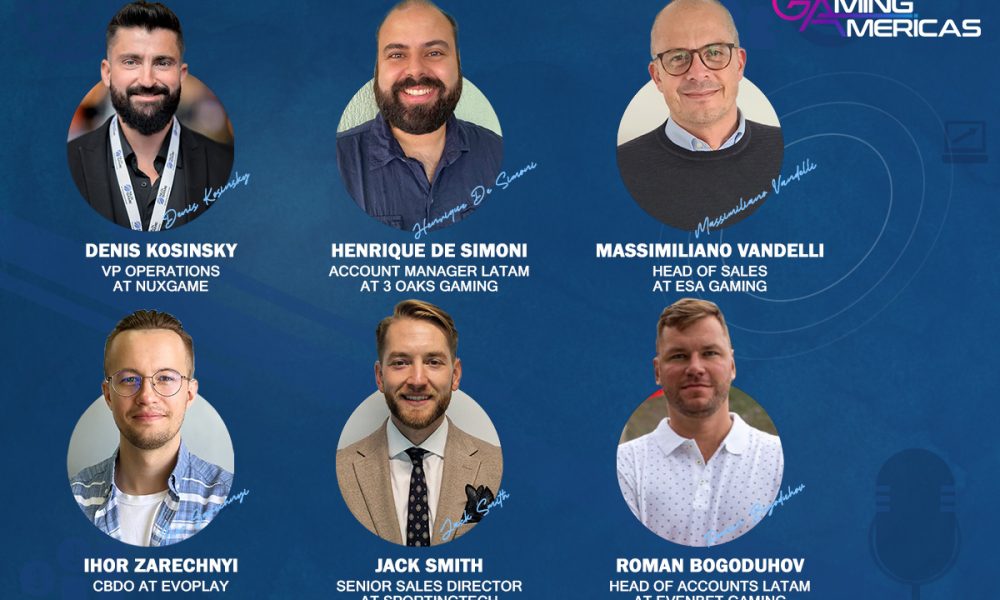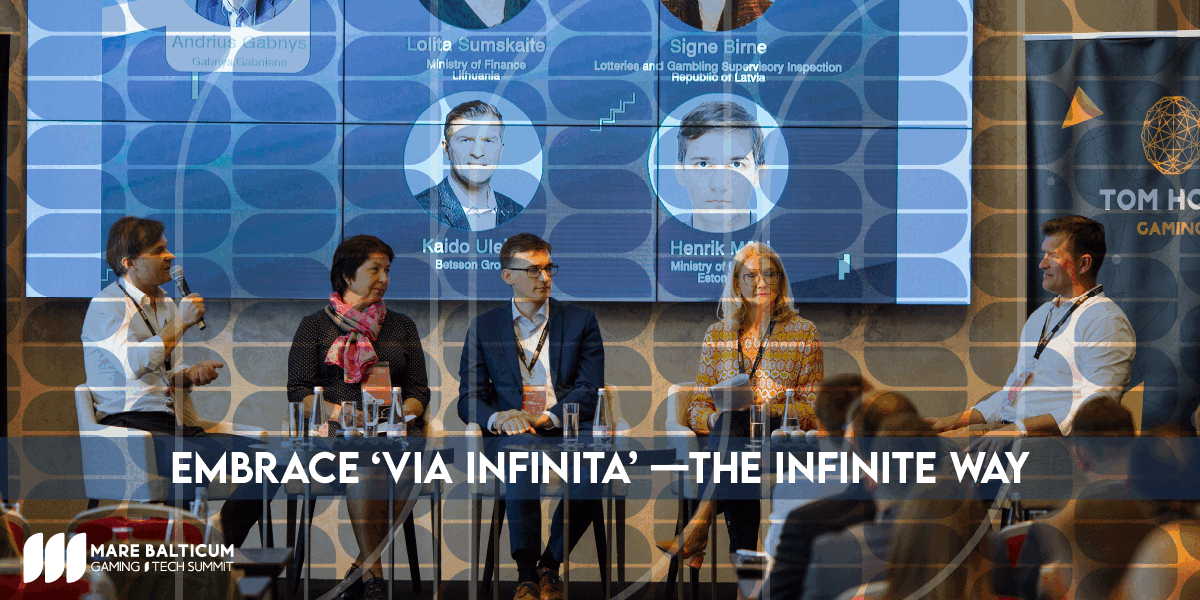Interviews
“We want to innovate and ensure that no two releases are ever the same”: Exclusive Nordics interview with Darren Stephenson from Push Gaming.

The Nordic region arguably has some of the most demanding players in Europe when it comes to slots – we caught up with Push Gaming’s Director of Business Development to talk through the supplier’s success in capturing their attention.
Can you give us a quick snapshot of Push Gaming’s operations in the Nordics?
The decision to enter the Nordics was a strong option for us for a couple of reasons. Primarily, this was due to the fact that the Nordics is one of Europe’s most established gaming regions. Online gambling (and in particular slots), are very popular there, so becoming a part of this was an obvious choice.
Also, at that point in time, we had chosen the Relax Gaming platform for our distribution channel. This provided us with a fantastic opportunity to reach a number of respected Nordic operators that were already integrated onto the platform and enabled us to establish a foothold in the region quite rapidly.
Naturally our CEO James Marshall started spending more time in Malta working with our partners to promote the games and ensure everything ran smoothly for them. Over time, and with plenty of Scandinavian operators having their base in Malta, it was a natural progression into becoming a really key region for us.
Why do you think your games have proven so popular in the region?
Scandinavia is one of the most mature markets when it comes to slots, and our slots are designed to be different and challenge the status quo.
Our design team utilises cutting-edge technology to deliver an immersive experience. The attention to detail, which is so important to us, fits perfectly in a market where players notice the smallest of differences, and our quality versus quantity approach resonates well with such a demanding group of players.
How would you profile the typical Scandinavian player? Are there typical demographics?
We try to avoid getting drawn into focusing too much on specific demographics. We simply aim to create a highly entertaining product that is set to resonate with all types of players.
We want to innovate and ensure that no two releases are ever quite the same. Of course, there are certain themes which you might expect to resonate with one region or market more than others, and that might become part of our launch planning discussions with our partners.
A good example of this might be that we have very high hopes for Joker Troupe, as the Joker theme has always proven so popular in the region.
The key takeaway for us here is much its popularity resonated with our approach. After all, we’re an entertainment company at heart – and evidently with the right combination of maths, graphics and immersion, we’ve learned that you can engage and entertain multiple types of players with the same game.
Are there certain design elements of game mechanics that you look to incorporate to meet regional preferences?
When it comes to mechanics, HypermodeTM, the in-game feature for Joker Troupe, has also been very well-received. It gives the player a timer instead of a set amount of spins, and when landing enough of the joker symbol, players can reset the timer and continue spinning.
The game is a fusion of a popular theme combined with exciting mechanics and was heavily influenced by the Scandinavian markets and the demand we’re seeing from Nordic players. The product owner that ran this project was also Swedish so his own experiences and preferences would of course have had an influence on the end result also.
That’s not to say we launched Joker Troupe with plans to make it all about that region, but rather – if it’s good enough for players renowned for their discerning nature, then we’re likely on to a winner.
How do you view the development of the Swedish market since regulation at the beginning of 2019?
It’s certainly evolving. It may have been a somewhat rocky start but being suppliers, we’re lucky that it’s been less of an issue for us. Sweden’s licensed gambling operators still reported strong numbers in revenue for the first half of 2020 so the market remains extremely important and will continue to be a key market for us and will certainly stay a big part of our future plans.
What can you tell us about your plans for 2021 and beyond for these markets?
In general, I see no reason why Scandinavia can’t continue its successful upward trend. Regulation will of course have an impact and is something that will need to be monitored.
When it comes to potential expansion, we are very close to launching with one of, if not the biggest, operators in the region – so we are super excited to see our games going live and look forward to sharing more news on that partnership.
We’ll also be steadily innovating and tailoring our platform in line with our planned expansion, which we hope will be of great benefit to our partners. And of course, we wouldn’t be Push Gaming if we didn’t have a line-up of new immersive games with great features in development, so stay tuned!
Powered by WPeMatico
Interviews
Exclusive Q&A w/ Steven Paton, Commercial Director at Wise Gaming

Could you describe the range of products and services that Wise Gaming offers? What makes them unique or appealing to potential clients?
Wise Gaming is the fastest-growing, Complete platform offering both White-Label & Turnkey Solutions. The Wise Gaming solutions are built from our team’s extensive experience: 15 years B2C and 10 years B2B. We know the importance of a truly modular approach, allowing our partner the ability to obtain our entire solution or individual components to enhance what they already have.
In what regions or markets does Wise Gaming primarily operate? Are there any plans for expansion into new territories?
Our focus has been on both the European & LatAm Continents. With enormous success in our B2C operations, we are relying on our extensive experience. We believe the balance between established & emerging markets brings both knowledge and the ability to learn and adapt, truly focusing on our partners needs without limitations.
2025 will be Wise Gaming’s year of expansion! 2024‘s goal is about building on our success in EU & LatAm whilst planning next years’ growth in both Africa & Asia.
What technologies does Wise Gaming employ to deliver its iGaming solutions? Can you highlight any proprietary technologies or platforms that differentiate your offerings?
From our 15 years of B2C success, we felt that we understood both the pleasure points and pain points that most operators face on a daily & weekly basis. Therefore, we build our Wise Gaming solutions with a customer-centric approach, How can we support our partners to support their customers. We diligently sourced the industry’s best-in-class providers for both our Sportsbook & Casino content, utilizing Enterprise software to provide the most robust offering in the iGaming industry.
Our dedicated in-house teams visualize, build and enhance our Proprietary systems for each of our Partner’s needs, making each of our partners brands Unique.
In what ways does Wise Gaming prioritise security and data protection within its technology infrastructure?
As previously mentioned, our customer-centric approach is vitally important to Wise Gaming and our Partners! Providing the correct technology and experience to our partners is key to having a successful KYC, AML, Due Diligence and Data Protection process. We opted for Amazon AWS solutioning to provide market-leading security, Encrypted databases & data storage, penetration resilience, DDoS attack elimination, dedicated Back-Office segmentation and User-based access, protecting player data while safeguarding our partners operations.
What are the current trends or challenges you’re seeing in the iGaming market? How is Wise Gaming adapting to these changes?
The speed in which technology advances is always a challenge for any provider. The key is to know your markets, the players, the accessibility of online entertainment such a sports betting & casinos and implement the technology that meets these variables. Everyone is talking about AI & Machine learning, and rightly so! With such advancements AI & Machine Learning models, it would be irresponsible not to utilize them. Whether it’s for Player customisation, Events based recommendation or supporting operational needs such as RG, KYC & AML, AI & machine Learning should be used to ENHANCE human interaction, not replace. At Wise Gaming, we have already implemented AI & Machine Learning models to provide the unique edge to our partners.
Also localized content is important. Every market is its own unique playground with their own specific cultural identities. Knowing these identities and becoming an expert in these will not only assist in the acquisition of players, it signifies a brand’s genuineness and authenticity to that market and allows greater player retention. At Wise Gaming we have already implemented A.I & Machine Learning models
How does Wise Gaming ensure compliance with regulations in various jurisdictions? How important is regulatory adherence in your sales approach?
I will answer these 2 questions together. The market is experiencing a shift in regulation, and compliance. MGA & CGA license domination has been challenged, with more and more markets opting for tighter safety measures and implementing their own self-regulated approach. This brings safety to players and trust.
Working alongside regulators will always help, and more importantly, we can learn from each other. Adhering to regulation is ultimately for a player’s safety and that is paramount for the industry’s longevity. Wise Gaming continuously enhances its platform to conform with regulations, making it safe and reliable for our partners.
What are the key factors potential clients considering when choosing an iGaming provider, and how does Wise Gaming address these factors in its offerings?
As previously mentioned, experience and knowledge are key attributes from both an operational and technical aspect. “You can’t plant apple trees and expect to get oranges!” Wise Gaming’s experience & knowledge puts us, and our partners, at the forefront of each market, allowing substantial growth and higher ROI.
Time to market should also be a priority. Whilst most Providers offer 2-4 months implementation time, Wise Gaming can deploy your platform within 2-4 weeks, giving us the competitive edge in a highly competitive space.
How does Wise Gaming incorporate feedback from clients into product development and improvement?
Experience and knowledge are simply 1’s learning over time. Our approach at Wise Gaming is that of a learning mentality, “you are never too old to learn!” iGaming is rich in experts – We trust our Partners, and they trust us, it’s the unification that builds long-term partnerships. We have 2 ears and 1 mouth, use them in that order!
What are the future goals and plans for Wise Gaming? Any upcoming innovations or developments you can share?
Our goal is to continue providing a reliable and robust platform, listening and delivering an innovative and unique solution for each of our Partners.
Innovative Developments – If we tell everyone, they won’t be innovative 😉 However, what I can say is that we are focused on “advanced”, real-time localised AI recommended content both Casino & Sportsbook.
The post Exclusive Q&A w/ Steven Paton, Commercial Director at Wise Gaming appeared first on European Gaming Industry News.
eSports
eSports in the CIS region , Q&A w/ Viktor Block, Senior Sales Manager/PandaScore

Esports has long been popular in the CIS region, with various top-tier teams and players all calling it home. How has the landscape evolved over the last few years? Have any particular trends emerged that have surprised you at all?
Esports boomed in the CIS region in 2008 when Multiplayer Online Battle Arena (MOBA) games became really popular. While esports had been a thing as far back as 2003, the rise of games such as Counter-Strike and DOTA2 was a major catalyst for the upward trajectory the sector has been riding ever since. In recent years, the infrastructure needed to support esports has improved drastically across the CIS region, including the construction of the Pixel Esports Arena in Minks, Belarus, and the Cyberspace Arena in Almaty, Kazakhstan, both of which hold top-flight contests. Internet connectivity has also improved, while support from local and international sponsors such as Monster Energy, Red Bull and War Gaming have provided funds for further investment while also driving awareness. Ultimately, this has seen the landscape evolve into a thriving industry with lots of opportunities for further growth.
In terms of trends, and especially relating to esports betting, I’ve been surprised by the high demand for betting on console games – we call them eBattles and they include disciplines such as eSoccer and eBasketball. I think this is just a natural development that has occurred off the back of strong demand for video game content, which is often the bridge between traditional sports and esports.
What factors have contributed to esports’ growth in the CIS over the past few years?
One of the biggest factors for me is that teams have become more professional and are now training and playing in well-run clubs. This takes place in dedicated buildings and rooms, set up with high-speed internet and the absolute best gaming equipment. Player salaries have also gone up, which has increased the calibre of players taking part in contests across the region, taking competitiveness to the next level. Today, many CIS players now play for high-ranked teams such as Virtus.pro, Team Spirit, Betboom or Na`Vi which compete on the international stage. This in turn is helping esports grow across the CIS region.
Given how many countries are in the CIS region, can you walk us through some of the biggest regulatory differences when it comes to betting on esports? And how does PandaScore navigate these changes?
The legality of betting and esports betting differs from country to country within the CIS region. Some are super strict or even prohibit gambling, while others take a more liberal approach, regulating the activity and licensing operators. Let’s take a look at some of the biggest markets and their approach.
In Ukraine, esports has been recognised as a sport since 2018 and in 2020 the country regulated and licensed gambling for the first time. The law focuses mostly on standard betting – sports and casino – but is likely to also include esports betting given that esports is a recognised sport in the country with tier-one Ukraine sportsbooks like Favbet and Parimatch offering it to their players.
Kazakhstan has a growing gambling industry with betting shops and casinos operating in major cities such as Almaty and Nur-Sultan. Gambling is regulated by the Ministry of Culture and Sports and while the regulatory framework is somewhat restrictive, sports betting – which is likely to include esports betting – is permitted.
Navigating the constant changes in betting regulation across the CIS region can be challenging, so we make sure to keep up to speed with the latest developments by monitoring legislative updates and amendments to regulatory guidelines. We also track industry trends and best practices to anticipate regulatory changes ahead of time, allowing us to adapt quickly if needed. This can involve benchmarking against competitors, attending conferences and networking with key stakeholders.
In your view, are there any unique opportunities for the expansion of esports and esports betting within the CIS region? And how does this differ to other regions?
It’s important to understand that CIS, especially Ukraine and Kazakhstan, play by their own rules. By that I mean they are very different to other esports markets, so don’t think what works in Italy will work in Ukraine. For example, while League of Legends is very popular in Europe, in CIS, it’s Dota 2 that takes the top spot. But for those who can understand the region and each market, there are plenty of opportunities to explore.
Let me elaborate. Dota 2 is thriving in the broader CIS, with regular tournaments and events attracting large audiences both offline and online. teams like Natus Vincere (Na’Vi), Virtus.pro and Team Spirit have achieved significant success in Dota 2 competitions, contributing to the game’s popularity in the region. While Dota 2 is big, other video games also enjoy significant popularity, including CS2, World of Tanks and Fortnite among others.
Operators need to consider this when deciding their markets and odds, marketing strategies and plans for player engagement.
What would you say is the key to creating a successful esports product for a CIS audience?
Understanding layer preferences in each market and delivering an experience that exceeds their expectations. For the CIS region, this means focusing on Dota 2 – this is a game that offers deep and strategic gameplay requiring teamwork, communication and skilful execution of plans and strategies. Its competitive nature appeals to gamers as they enjoy the challenge of multiplayer experiences – this goes back to the original MOBAs back in 2008. These factors must be present in the esports betting experience offered to players – at PandaScore, this means a comprehensive Dota 2 offering that covers markets such as Kills, Towers, Roshans and Barracks, with players able to challenge themselves in a betting competition against others.
Support is also key to delivering a quality player experience. We offer round-the-clock assistance and are regularly rolling out updates to improve the experience players receive when betting on esports at sportsbooks using our data, odds and betting tools such as our Bet Builder. We are always working hard to expand our offering to cover the most in-demand games including CS2, Valorant, Call of Duty and many more.
What trends or developments do you anticipate shaping the future growth of esports in the CIS region over the next few years?
The industry will continue to grow and become more professional. Esports is different to traditional sports and it still lacks recognition in some markets, even though it is considered an official sport in a growing number of countries across the CIS region. I think as it evolves, more governments will provide more support for esports as it brings tremendous economic, cultural and social benefits. This could include funding for esports initiatives, rolling out regulatory frameworks, helping to foster partnerships with esports organisations or simply recognising it as a sport.
The continued proliferation of smartphones across the region will be a further catalyst for esports growth. Titles such as PUGB Mobile, Free Fire and Mobile Legends: Bang Bang will attract large audiences and provide new opportunities for teams, players, sponsors and other stakeholders to explore. This is a really exciting time for esports and esports betting in the CIS region, and PandaScore is thrilled to be part of it.
The post eSports in the CIS region , Q&A w/ Viktor Block, Senior Sales Manager/PandaScore appeared first on European Gaming Industry News.
Brazil
Counting Down: A Roundtable Preview of Brazil’s iGaming Era

As Brazil finally gives the green light for sports betting and iGaming, industry leaders are gearing up for a transformative chapter in 2024. In this insightful roundtable discussion, we had the privilege of engaging with key figures, namely Henrique De Simoni (Account Manager LatAm at 3 Oaks Gaming), Massimiliano Vandelli (Head of Sales at ESA Gaming), Denis Kosinsky (VP Operations at NuxGame), Ihor Zarechnyi (CBDO at Evoplay), Jack Smith (Senior Sales Director at Sportingtech), and Roman Bogoduhov (Head of Accounts LatAm at EvenBet Gaming) to delve into the exciting prospects of casino entry into the newly regulated market. Our focus centred on the meticulous preparations undertaken by suppliers, understanding local player preferences, and exploring the collective vision for the future of this burgeoning market.
As the journey to secure the final approval for iGaming regulation in Brazil concludes, what strategies and preparations has your company put in place for the upcoming market launch?
Henrique De Simoni
Despite Brazil’s iGaming market being in its incipient stages, it has transitioned from a rising star to a tangible reality. This regulatory milestone in the largest Latin American country signifies a plethora of opportunities for the entire iGaming ecosystem, spanning from operators to providers.
As a company known for its agility and meticulous attention to detail, we’ve been actively engaging with key events in the region such as SBC Brazil, and SiGMA Americas. By fortifying our network and relationships with major operators, platforms, and aggregators, we’re positioning ourselves strategically for the impending market launch.
Massimiliano Vandelli
The impending regulation of iGaming alongside sports betting in Brazil presents a pivotal opportunity for our company. We’ve meticulously prepared for this milestone by adopting several strategic initiatives. Firstly, we recognise the significance of a diverse portfolio, particularly given the potential exclusion of certain online casino games. Therefore, we’ve focused on ensuring a balanced offering to cater to varying preferences and regulatory requirements.
Localization lies at the core of our approach. Brazil’s vast and distinct market demands tailored solutions, encompassing language support, minimum bets, and game types that resonate with local preferences. Additionally, understanding the nuances of player behaviour, such as volatility preferences, is crucial for delivering a compelling gaming experience.
Furthermore, leveraging our existing partnerships with established operators positions us strategically in capturing a substantial market share. We have a track record of success with these operators, and collaborating closely with them not only strengthens our market presence but also facilitates smoother market entry.
Ihor Zarechnyi
Evoplay’s business strategy after the final approval of iGaming regulation in Brazil will involve forging key partnerships to strengthen our position in the Latin American market.
With Brazil’s population surpassing 215 million and the local audience’s passion for entertainment, our diverse game portfolio is calibrated to cater to their preferences. Our overarching goal is to replicate and surpass the success we’ve already achieved in Latin America. We focus on enhancing the gaming experience of Brazilian players by addressing their entertainment requirements.
Denis Kosinsky
As for all new market entries, our strategy for Brazil consists of compliance, localization, partnerships and innovation. Much like Europe, Brazil is a highly fragmented market and each state should be approached on a case-by-case basis. We are customizing our platform for Brazilian players by adapting to the culture in terms of language, local payment methods and games that resonate locally while our multi-brand feature can be used by casino operators to manage different geos. We’ve also turned our attention to forming partnerships with Brazil-based companies, enabling us to both broaden our reach and enhance our offering.
With smartphones dominating as the preferred device for iGaming, we’re optimising our tech’s mobile compatibility for a superior experience. In addition, our marketing efforts are tailored to engage Brazilian audiences through localized content and community events. As Brazil finalizes its iGaming regulations, NuxGame is ready to deliver a comprehensive and culturally attuned gaming experience.
Jack Smith
We have recently seen that the Brazilian government has now officially recognised GLI as a certified testing lab. As part of this we have made continued efforts to conform to GLI 19 and GLI 33 which are synonymous with other markets on a global level. In addition to that we have also been working closely with Serpro on data transfer requirements.
In terms of strategy, our stance remains the same as always. We are focused on collaborating with our operators to ensure that we give them all of the technical tools and capabilities to harness their own local expertise and continue to be successful. This is crucial in what will likely be a very competitive market.
Roman Bogoduhov
The country is still at the early stages of regulation, so setting rules and transforming them into business practices will take several long and hectic months. Traditionally, online poker is not the first vertical to be regulated, and this is the case for Brazil as well: our turn will come after sports betting and online casino games. What we are doing now is a lot of homework and preparation: connecting with the market stakeholders, getting to know the player preferences, specific market challenges, and software demands.
Product localisation and customisation are at the core of the EvenBet Gaming platform, and our offering has to be ready for the market launch. So, our business development team explores the market and identifies the features and solutions needed by the Brazilian operators and players, so that we can adapt our product to their needs.
Also, it’s crucial to mention that the Brazilian iGaming community is quite closed and somewhat wary towards foreign vendors and providers, preferring to establish partnerships with companies that demonstrate a proven success record in the local market. While regulation moves forward, we can take it slowly, creating fruitful relationships, showcasing examples of our partnership with operators in South America and educating the market on the business strategies allowing us to earn on poker.
In anticipation of the iGaming launch, which specific verticals do you believe will capture the hearts of local players, and have you identified any unique preferences or trends that are shaping your approach?
Denis Kosinsky
As part of our continuous improvement strategy, NuxGame conducts regular market research and player feedback analysis to tailor our offering and stay ahead of the tech curve. With our aims of delivering a diverse, engaging, and secure gaming environment that aligns with local player preferences, we have identified key verticals that are poised to captivate local players.
Mobile gaming is one of the largest growing trends worldwide and Brazil is no different. NuxGame’s platform has optimized games to present a seamless mobile experience, catering to this increasing demand. Looking at specific genres, live dealer games perform particularly well in Brazil. For these titles to flourish moving forward, it is important to ensure that there is a Portuguese-language option in addition to high-quality live streaming and a diverse array of experiences to engage as many players as possible. Brazil is also a large adopter of cryptocurrency and blockchain technology. NuxGame’s Web3 technology and cryptocurrency purchasing feature position us to leverage these technologies for secure and efficient gaming experiences.
Ihor Zarechnyi
Initial findings from Brazil reveal a strong preference among the local audience for online casinos and sports betting. Based on third-party market research, it appears that Crash games capture the attention of 79.61% of Brazilian players. Following closely behind are slots, with a significant 39.83% engagement. Leveraging these data and our experience in the LatAm market, we’re confident that Evoplay’s diverse game portfolio, particularly our sport-themed titles, will deeply resonate with this audience.
However, despite our solid foundation, we remain committed to further understanding the local business culture and refining player communication approaches for strategic success. We’re actively developing exclusive projects like Slotopia and Bingo to enrich our offerings and cater to diverse player demographics.
Roman Bogoduhov
Undoubtedly, sports betting will stay the top online vertical in Brazil. As the market expands, new technologies and advanced solutions are coming to the country, online sports betting has a chance to become more prominent than offline, thanks to live bets, mobile access, and fast and secure payments which become available as the regulation settles.
Traditionally, the lottery is the second most popular gaming activity. Still, the state has a monopoly here, so the operators and vendors will demand lottery-like games: bingo, scratch games, keno, etc. Live casino games, card games (including poker and blackjack), and new trends like crash games will follow the leaders.
Jack Smith
As we know in most established markets there is a traditional split between sports betting and casino with Brazil unlikely to differ. Brazilians have a huge affinity with Soccer and that is not going to change anytime soon with more operators vying for sponsorship opportunities with its biggest clubs.
The inclusion of iGaming into the bill was hugely important as well as this represents a sizeable piece of the market. The likelihood is that we will likely see this continue to grow through traditional live dealers and crash games which have proven to be popular in the region as well.
At Sportingtech we recognize iGaming’s importance, hence why we are continuing to partner with local games providers to supply fresh new casino content that we feel will identify with the consumer. It remains to be seen how the landscape will change in the future but as always, our teams will continue to research the market and look for new innovative products to satisfy Brazilian players.
Massimiliano Vandelli
We foresee a diverse landscape of gaming verticals that will resonate with Brazilian players, driven by both traditional and innovative content. One area of particular promise lies in non-traditional games, such as crash games, which have demonstrated considerable appeal across Latin American markets. Our EasySwipe portfolio, in particular, stands out as a compelling offering for sportsbooks seeking to diversify into casino games. For instance, games like Goal Mine World, which allows players to personalize their gaming experience by selecting colours associated with the Seleção Canarinha (Brazilian national team), are tailored to resonate with local tastes.
portfolio, in particular, stands out as a compelling offering for sportsbooks seeking to diversify into casino games. For instance, games like Goal Mine World, which allows players to personalize their gaming experience by selecting colours associated with the Seleção Canarinha (Brazilian national team), are tailored to resonate with local tastes.
Our widget integration within sportsbooks has already yielded remarkable results, fostering player loyalty and facilitating seamless cross-selling between sports and casino content. This underscores the importance of delivering fast and engaging casino experiences that complement sports betting activities.
While sports are expected to drive significant engagement, the initial interest from online operators targeting the Brazilian market indicates a growing demand for high-quality casino content as well. In response, our latest line of video slots, featuring titles like 12 Deadly Spins and Candy Drops, is poised to captivate avid casino enthusiasts seeking immersive gaming experiences.
Henrique De Simoni
Absolutely! With our company’s wealth of experience in the iGaming industry, I’ve been entrusted with spearheading our efforts in LatAm, particularly in Brazil. Understanding the local culture, speaking the language, and possessing a background in the B2C sector allows us to infuse our offering with user-centric experiences for enhanced player engagement.
I firmly believe that cross-selling will be the primary vertical to target. Seamlessly transitioning players from the sportsbook to casino presents a golden opportunity, especially in a country where sports hold significant cultural sway. While crash games have made initial waves, we anticipate slots to take centre stage in the long run. Our successful slot title, Coin Volcano, with its captivating theme, user-friendly gameplay, and vibrant graphics, exemplifies the high-quality gaming experiences we’re aiming to deliver in the market.
What are your overarching expectations for its trajectory? Are there specific milestones, challenges, or growth indicators that you foresee shaping the landscape in the coming years?
Massimiliano Vandelli
Looking ahead, we anticipate various challenges and growth indicators that will shape the trajectory of our operations in Brazil. Regulatory developments, including the implementation of iGaming legislation and associated licensing frameworks, will significantly influence market dynamics and operator engagement. Furthermore, evolving player preferences and market trends, such as the integration of sports and casino content, will present both opportunities and challenges for our growth strategy.
Primarily our aim is to secure significant exposure for our games with leading operators in the market. To achieve this, we are committed to fostering and strengthening our relationships with major partners in Latin America, who are poised to play a pivotal role in the market. We’re exploring opportunities for exclusive partnerships, developing sports-driven content, and creating bespoke games tailored to the requirements of major operators. By prioritizing localization, we aim to enhance player engagement and drive adoption of our offerings across the Brazilian iGaming landscape.
Jack Smith
Given the strong interest by what feels like the majority of the iGaming industry, it’s fair to say that everyone sees the growth potential in Brazil over the coming years. Research suggests that revenues will reach $2bn in 2024 and a projected market volume of $4bn by 2029. If those projections were to be correct, Brazil would solidify itself as one of the largest markets globally.
There aren’t specific milestones we are working towards but the continued increase of internet penetration in Brazil will play a crucial role in the development of the online gambling market. Smartphones are becoming more cost effective and available to everyone, and with the incoming legislation we will see the introduction of native apps to the iOS and Google Play stores. This will add an additional layer of convenience to the consumer.
There is also the retail opportunity, which has been hidden in plain sight for a number of years, so it will be interesting to see whether operators transition into retail to penetrate players who are limited to cash only transactions.
Ihor Zarechnyi
With the market’s upcoming launch, we anticipate a notable surge in activity. However, like any new endeavour, this journey may be accompanied by challenges and will require thoughtful, well-balanced actions from regulatory authorities and market participants.
We maintain a positive outlook based on predictions that Brazil’s online sports betting, casino, and bingo market could soar to nearly $3 billion in revenue by 2027, positioning it among the world’s leading markets.
As we navigate rapid growth, it’s important to acknowledge the potential risks, including market overheating. However, armed with a robust strategy and a line-up of games that culturally connect with Brazilian players, we’re well positioned for success in further solidifying our standing in the LatAm market.
Henrique De Simoni
The average Brazilian spends over nine hours on the internet per day, signalling a profound digital presence ready for exploration. As such, we’re poised to leverage this extensive online engagement by ensuring our high-quality games, coupled with robust gamification elements, provide unparalleled slot experiences.
In anticipation of numerous new entrants and potential mergers and acquisitions in the market, we’re gearing up for increased competition. With over 134 companies vying for licences in Brazil, each capable of operating three platforms, the landscape is primed for expansion, with an estimated 402 regulated betting sites anticipated. Despite the challenges ahead, we’re optimistic that our expertise and ability to resonate with the Brazilian audience will set us apart. The best is indeed yet to come!
Roman Bogoduhov
Now the Brazilian iGaming market is shaping, and once the project is launched and adapted to the local preferences, it’s relatively simple to compete and acquire players. The operators will win with attractive bonuses and promotions, well-thought campaigns, and in particular social media marketing and influencer-based advertising. Brazil is one of the biggest influencer markets in the world, according to the statistics, up to 45% of consumers here trust social media platforms and recommendations. At this stage, I will not be surprised if Instagram and TikTok are literally invaded by sports betting and casino placements.
During this initial bountiful period, operators must keep in mind long-term goals. Given the difficult history of long and painful payouts and the lack of local or at least Portuguese-speaking customer support, these two operational aspects are irreplaceable for building trust and long-term engagement and are currently in the top three reasons for player churn.
Denis Kosinsky
With regulation finally being implemented, we can expect Brazil to become a favorable market for growth and sustainability. Early insights signal toward rapid expansion fuelled by the recent legislation, while its young, tech-savvy population’s strong interest in digital entertainment means it is poised to become one of the biggest markets worldwide. Pivotal to success in the market will be player acquisition and retention strategies that provide a superior user experience. Initiatives such as loyalty systems, player battles and brand customization will be critical in retaining players and staying competitive.
We’re closely monitoring growth indicators such as user engagement metrics, market share expansion, and the adoption of new gaming technologies to adapt our strategies for sustained growth. Furthermore, responsible gaming, at its core, is the most important contributor to making the gambling industry sustainable in the long-term. To play our part in this, NuxGame will be focusing on ethical practices to foster a safe and sustainable gaming environment.
Stemming from complex regulatory frameworks, compliance requirements and heightened competition, encountering challenges in a new market is unavoidable. Through our dedication to innovation, customer satisfaction, and strategic partnerships we can address these obstacles before they arise and ensure a smooth launch into the regulated Brazilian market.
-

 Balkans6 days ago
Balkans6 days agoAnakatech Incorporates GameArt’s High-Quality Slot Titles into Cutting-Edge Platform
-

 Baltics6 days ago
Baltics6 days agoNew Survey Reveals 80% of Lithuanians Would Welcome a Ban on Gambling Ads
-

 Australia6 days ago
Australia6 days agoSkyCity Appoints Jason Walbridge as Chief Executive Officer
-

 GAT Expo6 days ago
GAT Expo6 days agoNOVOMATIC: The Epicenter of Innovation and Entertainment at the 25th GAT in Cartagena
-

 Latest News6 days ago
Latest News6 days agoPlayson grants clown unlimited powers in Energy Joker: Hold and Win
-

 Latest News6 days ago
Latest News6 days agoNetBet Casino Joins Forces with Play’n Go
-

 Latest News6 days ago
Latest News6 days agoLuxury and grandeur await in latest Blueprint Gaming title Midas King of Gold
-

 Andrew Cochrane Chief Business Officer of GiG6 days ago
Andrew Cochrane Chief Business Officer of GiG6 days agoGiG increases Ontario market presence, powering the launch of Casino Time




















